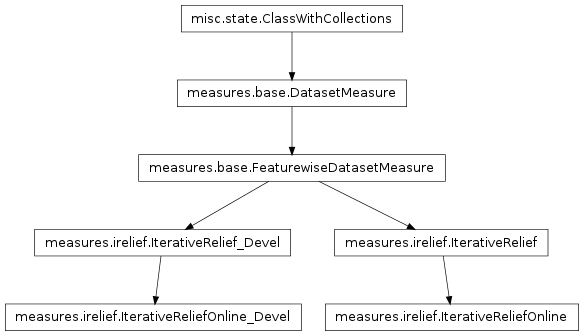 |
Multivariate Pattern Analysis in Python |
 |
Multivariate Pattern Analysis in Python |
Inheritance diagram for mvpa.measures.irelief:

FeaturewiseDatasetMeasure performing multivariate Iterative RELIEF (I-RELIEF) algorithm. See : Y. Sun, Iterative RELIEF for Feature Weighting: Algorithms, Theories, and Applications, IEEE Trans. on Pattern Analysis and Machine Intelligence (TPAMI), vol. 29, no. 6, pp. 1035-1051, June 2007.
Bases: mvpa.measures.base.FeaturewiseDatasetMeasure
FeaturewiseDatasetMeasure that performs multivariate I-RELIEF algorithm. Batch version.
Batch I-RELIEF-2 feature weighting algorithm. Works for binary or multiclass class-labels. Batch version with complexity O(T*N^2*I), where T is the number of iterations, N the number of instances, I the number of features.
See: Y. Sun, Iterative RELIEF for Feature Weighting: Algorithms, Theories, and Applications, IEEE Trans. on Pattern Analysis and Machine Intelligence (TPAMI), vol. 29, no. 6, pp. 1035-1051, June 2007. http://plaza.ufl.edu/sunyijun/Paper/PAMI_1.pdf
Note that current implementation allows to use only exponential-like kernels. Support for linear kernel will be added later.
Note
Available state variables:
(States enabled by default are listed with +)
See also
Please refer to the documentation of the base class for more information:
Constructor of the IRELIEF class.
| Parameters: |
|
|---|
Compute hit/miss dictionaries.
For each instance compute the set of indices having the same class label and different class label.
Note that this computation is independent of the number of features.
XXX should it be some generic function since it doesn’t use self
Exponential kernel.
Bases: mvpa.measures.irelief.IterativeRelief
FeaturewiseDatasetMeasure that performs multivariate I-RELIEF algorithm. Online version.
This algorithm is exactly the one in the referenced paper (I-RELIEF-2 online), using weighted 1-norm and Exponential Kernel.
Note
Available state variables:
(States enabled by default are listed with +)
Constructor of the IRELIEF class.
| Parameters: |
|
|---|
Bases: mvpa.measures.irelief.IterativeRelief_Devel
FeaturewiseDatasetMeasure that performs multivariate I-RELIEF algorithm. Online version.
UNDER DEVELOPMENT
Online version with complexity O(T*N*I), where N is the number of instances and I the number of features.
See: Y. Sun, Iterative RELIEF for Feature Weighting: Algorithms, Theories, and Applications, IEEE Trans. on Pattern Analysis and Machine Intelligence (TPAMI), vol. 29, no. 6, pp. 1035-1051, June 2007. http://plaza.ufl.edu/sunyijun/Paper/PAMI_1.pdf
Note that this implementation is not fully online, since hit and miss dictionaries (H,M) are computed once at the beginning using full access to all labels. This can be easily corrected to a full online implementation. But this is not mandatory now since the major goal of this current online implementation is reduction of computational complexity.
Note
Available state variables:
(States enabled by default are listed with +)
See also
Please refer to the documentation of the base class for more information:
Constructor of the IRELIEF class.
| Parameters: |
|
|---|
Bases: mvpa.measures.base.FeaturewiseDatasetMeasure
FeaturewiseDatasetMeasure that performs multivariate I-RELIEF algorithm. Batch version allowing various kernels.
UNDER DEVELOPEMNT.
Batch I-RELIEF-2 feature weighting algorithm. Works for binary or multiclass class-labels. Batch version with complexity O(T*N^2*I), where T is the number of iterations, N the number of instances, I the number of features.
See: Y. Sun, Iterative RELIEF for Feature Weighting: Algorithms, Theories, and Applications, IEEE Trans. on Pattern Analysis and Machine Intelligence (TPAMI), vol. 29, no. 6, pp. 1035-1051, June 2007. http://plaza.ufl.edu/sunyijun/Paper/PAMI_1.pdf
Note that current implementation allows to use only exponential-like kernels. Support for linear kernel will be added later.
Note
Available state variables:
(States enabled by default are listed with +)
See also
Please refer to the documentation of the base class for more information:
Constructor of the IRELIEF class.
| Parameters: |
|
|---|
Compute hit/miss dictionaries.
For each instance compute the set of indices having the same class label and different class label.
Note that this computation is independent of the number of features.